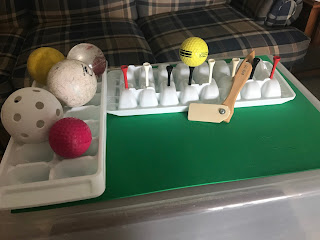Developing OT Skills
As an occupational therapy student who has barely dipped my toes into the large pool of OT, any moment where I am able to practice my OT skills is exciting. My grandmother was recently diagnosed with Leukemia and has progressively become weaker. I became one of her caregivers and soon realized that I think differently than any of my other family members.
I had began working on an activity analysis for a class assignment, which led me to develop a habit of breaking down random common activities in my head step-by-step. I find activity analysis's interesting because it is amazing how many steps are involved in everyday task that take us no more than two minutes to complete. When I spend time with my grandmother, I catch myself thinking about every step it is going to take her to do each task.
One night, she asked for a flash light before she went to sleep. When I went to get the flash light for her, I began to think about in what event she would use the flash light and how I could make whatever she needed it for easier. One of the first steps in this "activity analysis" I was doing in my head was to turn on the flash light. With her being so weak, I was not sure she would even be able to press the button to turn the flashlight on. So when I brought it to her, I asked her to turn it on. As I expected, she was to weak to use a flash light that had a button. So I went on another search and found one that had a switch. This time when I asked her to turn it on, she was able to do it without a problem.
Though the flash light was not that crucial for her and I was almost positive she would not use it, I was still very satisfied with myself for thinking like an OT when it came to a simple flash light. I would not have had this realization if I had not been thinking about the flash light in a manner of body function, performance skill, and required actions. This situation made me realize why and how an activity analysis is important for an occupational therapist.
I had began working on an activity analysis for a class assignment, which led me to develop a habit of breaking down random common activities in my head step-by-step. I find activity analysis's interesting because it is amazing how many steps are involved in everyday task that take us no more than two minutes to complete. When I spend time with my grandmother, I catch myself thinking about every step it is going to take her to do each task.
One night, she asked for a flash light before she went to sleep. When I went to get the flash light for her, I began to think about in what event she would use the flash light and how I could make whatever she needed it for easier. One of the first steps in this "activity analysis" I was doing in my head was to turn on the flash light. With her being so weak, I was not sure she would even be able to press the button to turn the flashlight on. So when I brought it to her, I asked her to turn it on. As I expected, she was to weak to use a flash light that had a button. So I went on another search and found one that had a switch. This time when I asked her to turn it on, she was able to do it without a problem.
Though the flash light was not that crucial for her and I was almost positive she would not use it, I was still very satisfied with myself for thinking like an OT when it came to a simple flash light. I would not have had this realization if I had not been thinking about the flash light in a manner of body function, performance skill, and required actions. This situation made me realize why and how an activity analysis is important for an occupational therapist.

Comments
Post a Comment